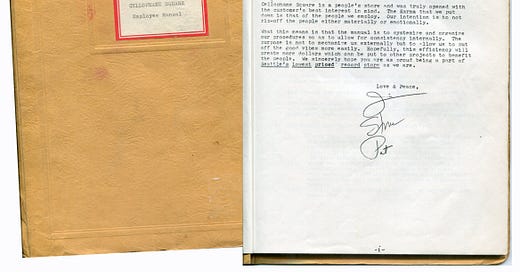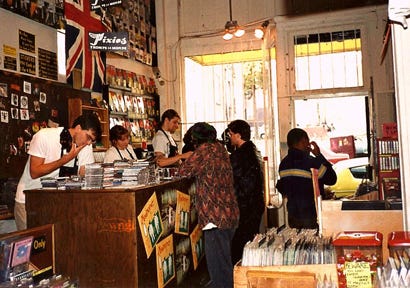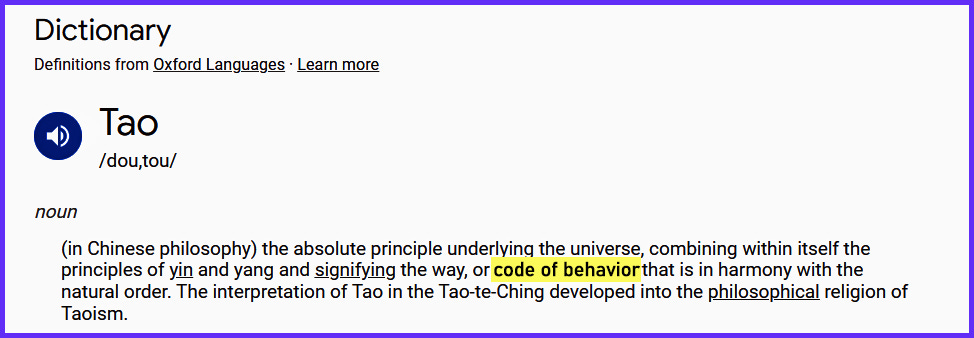The Record Store Years 15) The Tao of Cellophane Square
A memoir of 25 years (1975-2000) spent working in the world of records & music in Seattle, with occasional side trips into writings on Led Zeppelin and other adventures from my musical life.
Cellophane Square was born in 1972 when many of the ideals and tenets of 1960s counterculture were still front of mind, especially on the west coast. Owners Jim and Steve were in their early 20s and veterans of Woodstock, which they attended together while still in college, and were themselves exemplars of the ‘hippie capitalism’ referred to elsewhere in this memoir. The introduction to the employee manual that I was given when I started in 1975 was filled with some of the pithy aphorisms of the day regarding “karma” and “the people” – concepts which may appear quaint fifty years later, at least in the context of running a retail business, but still carried some weight in the mid-‘70s.
The foundation of the company was firmly built on these tenets – namely that business would be conducted honestly and that customers and employees would be treated fairly. I took these concepts seriously and even though in later years the capitalism part played a bit louder than the original hippie ideals, they pretty much held throughout my tenure and played a big part in the success of the stores.
It can be argued that hypocrisies existed in the company – over the years many employees felt they were not treated fairly in terms of the low pay and lack of traditional benefits. These issues were something I always struggled with and had many [usually losing] arguments with the owners about. And the ethics of buying and selling promos and shrink-wrapping ‘cleans’ to sell as new, not to mention bootlegs, can also be called into question – though these activities were generally rationalized at the time as being beneficial to ‘the people’ as in, “let’s stick it to The Man!” ‘Hippie capitalism’ is an oxymoron in itself, but I personally tried to maintain high standards of honesty and transparency in the company and treat everyone with respect, and I always felt that my approach brought its own rewards. For the record, I do believe in karma.
Customer service is important in any business that deals with customers, and in my opinion it is the most important thing of all in retail. I have absolutely zero tolerance for rude treatment as a customer myself and can cite many instances when I’ve gone into a shop once, been dissatisfied with the way I was treated, and never gone back - even if it meant paying more for the same item somewhere else. In setting the standards for hiring employees at Cellophane Square, I always looked for what I termed a ‘retail personality’ in applicants – people who were outgoing, friendly and would look you in the eye while always telling the truth. This mattered greatly in the day-to-day selling of records, tapes and CDs to the general public, but where it mattered even more was in the buying of said items from our selling customers.
Used product was always the lifeblood of Cellophane Square. Except for cut-outs and the shrink-wrapped promos and ‘cleans’ we sold as new, used product was all the stores carried until about 1982. We were able to sell used LPs, tapes and [later] CDs at a high rate of mark-up (100% or more, averaged out), and even after we got seriously into new product and became a full-service record store, it was the used product that created the profit and paid the bills. Since one could not simply pick up the phone and place an order as with new items, we had to rely on the selling customer who chose to bring in his or her records to sell or trade in. Because of this, it was extremely important to make the selling customer happy by paying high, while at the same time paying low enough that we could make our markup.
This could be kind of a balancing act, especially since the record business was fickle – today’s hits may be tomorrow’s duds, and vice versa. Music knowledge, and more accurately knowledge of the current music scene and record business, was critical in becoming a good buyer, and a high premium and many hours of time were put into training our employees to buy used product.
Above: A busy buying day at the front counter of the UD store, circa 1992.
A couple of policies that set us apart from our competition were very important to the success of the company. One was that everyone on the staff was trained to buy, so that a customer would never be told, “our buyer is on a break, or isn’t working today, please come back later.” There was always someone on duty who could go through and bid on your stack, usually immediately or within a few minutes of coming in, depending on how busy it was.
The other was the policy of making an offer on every item a customer brought in, even if it was only a nickel, instituted in about 1977. Very few people who took the trouble to drive to the U-District, park, and lug a heavy stack of 50 or 75 LPs into the store were happy when told they’d have to take half that stack home because we couldn’t buy it due to condition or lack of sales potential. In most cases our competition would outright refuse the ‘junk’, and there were also instances of buyers not being on duty or employees in the other stores being so rude or condescending that the selling customer would leave dissatisfied or pissed off.
To ensure that we got the best possible shot at procuring used product from the general public, from its inception Cellophane Square vowed to pay the most we could for people’s records based on their value in the marketplace. We were transparent about the reasons we were offering various prices on what people brought in, and most important we would physically divide the records into stacks by price so the customer could clearly see what was being offered on each LP between the high and the low ends. In most of the other stores the buyer would go through the stack and offer a bulk price to the customer, and people who came in to sell to us were often pleasantly surprised at our system.
It didn’t hurt that our main competitor with three different stores in more high-profile locations than ours had exactly the opposite policy – unspoken of course – of paying the lowest they could possibly get away with. There were many, many instances of a customer coming into Cellophane Square for a bid, and once we made the offer telling us that they had just been offered less than half that around the corner. The word got around and the savvy shoppers and sellers of Seattle soon knew us as the best place to sell, and buy.
NEXT: The Art Of Buying







Brings back some wonderful memories of learning to be a good buyer and of Saturdays behind the back counter going through stacks of records as a buyer. Also remembering that the junk records we bought for a nickel were often sold for .25 or in “mystery packs” wrapped in newspaper for 10 for $1. Kinda a brilliant retail strategy.
I always equated a trip to my local used record store to 'going fishing'. It was always a prudent idea to carry a little more cash than anticipated handing over for purchases because there was always an unanticipated treasure or two to look forward to taking home. As far was Cellophane was concerned, the staff always had a good vibe and was helpful as well as educated in regard to product each store had. and you, Hugh, was a major reason I looked forward to the experience.